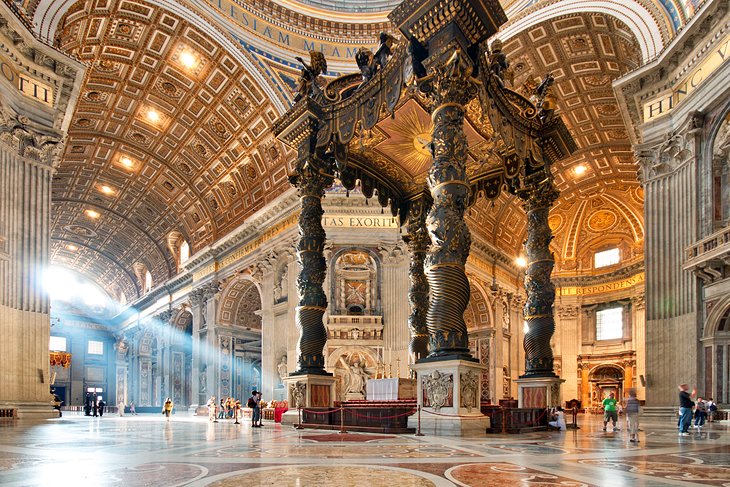Restoring the splendor of God’s Temple
(Image from: 12 Top-Rated Tourist Attractions in the Vatican | PlanetWare)
1st Reading: Ex 20:1-17
2nd Reading: 1Cor 1:22-25
Gospel: Jn. 2:13-25
The call to holiness is a universal call. It is
a call that both God and the church want every human being to answer. Every year,
during the season of Lent, the church reminds us of this call and expects us to
answer it with our eyes fixed on Christ who has left a way for us to follow,
the way of the cross.
It was because of the call for every human
being to be holy that God gave the ten commandments to the people of Israel,
and to us the new people of Israel. The ten commandments, as we saw in the
first reading of today from the book of Exodus, contains a list of actions that
we should do and those we should not do in order to live a holy life. But
remarkable is the division of these commandments; it has a lesson to teach us
on our journey to holiness. The ten commandments are divided into two parts:
the first part consists of number one to three, it dealt on what we should do
towards God in order to be holy, while the second part starts from number four
and ends at number ten. This later part comprises what we should do towards our
neighbours in order to be holy.
What, then, does this division teach us? It
teaches us that to be holy, we have to fulfil our duty towards God and our
fellow human beings. No aspect of this duty should be lacking. It is, however,
unfortunate that some Christians think that what it takes to be holy is only
standing before God every day in prayer and fasting. In fact, no one can love
God without loving his fellow human being. Therefore, as we renew our lives
this lent through the sacrament of reconciliation, let us also renew our
relationship with our fellow human beings. Let us put ourselves at the honest
service of our brothers and sisters.
In the Gospel reading, Christ turns our
attention to an act that is required of anyone who wants to maintain a holy
relationship with God, it is the act of keeping the house of God holy. As we
saw in today’s Gospel, Jesus made a whip out of a rope and flogged out those
who desecrated the house of God. He said we should not make God’s house a place
of buying and selling. The house of God is not just the physical structure, it
is also our bodies as saint Paul told us in his first letter to the Corinthians
(6:19-20). If we want to live a holy life, we must keep our bodies – the temple
of God – holy. Jesus frowns at any form of misuse of this temple, just as we
saw in the Gospel. Jesus wants us to stop any form of commercialization of our
bodies.
It is however strange that in our world today,
many people do not consider keeping their body pure as a necessity for a good
relationship with God. We live in a world where the logic of autonomy has led
many people to feel that their body is their own property and must be treated
the way they like. This has led to many sins against our bodies: mutilation of
the body, abortion, transgender, prostitution, all forms of immoral life, and all
forms of sinful pleasure, etc. but the truth is that this body is not just our
own, it is the temple of God and should be kept clean. Any misuse of the body
attracts the anger of Jesus. I do not know how you are treating your own body. But
the question we should ask ourselves this Sunday is: will Christ be happy with
the way I am using/treating my body at this present time? Or if Jesus visits me
now, will he praise me for the way I have handled my body (His temple) or will
he do to me what he did to the money changers and buyers in the temple?
Dear brothers and sisters, we live in a world
where our efforts to keep our bodies holy for the indwelling of the Spirit of
God is termed foolishness and unprogressive lifestyle by many people. People
criticize us for telling them not to misuse their bodies, for preaching the gospel
of purity and holiness of the body, and for modelling our lives according to
the teachings of the ten commandments. But then, dear friends, when people
criticize you for these reasons, you should find solace in the second reading
of today. It says that Christian life is strange to both Jews and Greeks and to
many of our friends too. They call it foolishness. Truly, Christianity is a
sign of contradiction in the world. Therefore, do not be discouraged when
people call you all sorts of negative names just because you told them not to
misuse their bodies. Do not be discouraged when people mock you because you are
keeping your body holy. Do not be discouraged when your friends abandon you
because you told them that you do not support their ethics of autonomy, which
says that bodies should be treated the way we want without sparing a thought
for God’s call to holiness. Always remember that, according to the second reading
of today, the foolishness of God is wiser than human wisdom, and
the weakness of God is stronger than human strength (1 Cor. 1:25)
Dearest friends, the period of Lent is a
special time to recover the holiness of our bodies. Let us go to the sacrament
of reconciliation and wash our bodies clean of all infirmities, so that God can
dwell in us once more.
Fr. Isaac Chinemerem Chima




.jpg)
.jpg)
No comments:
Post a Comment